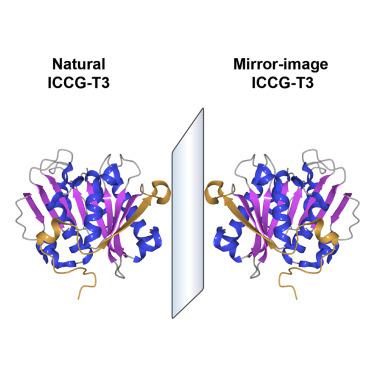Chem ( IF 19.1 ) Pub Date : 2022-10-04 , DOI: 10.1016/j.chempr.2022.09.008 Cong Guo , Li-Qun Zhang , Wenjun Jiang

|
Biodegradation of plastics through the use of enzymes provides an attractive, environmentally friendly solution to dispose of and recycle plastic wastes. Although many natural and engineered plastic-degrading enzymes have been developed, their practical applications are hindered by their biodegradation in open environments. We reasoned that most popularly used plastics, such as polyethylene terephthalate (PET), are achiral and hence can be hydrolyzed by both the l- and d-amino acid versions of plastic-degrading enzymes. Here, we chemically synthesized a mirror-image version of the 231-aa PET hydrolase, which is capable of efficiently degrading a variety of plastics such as PET, polybutylene terephthalate (PBT), and polybutylene succinate (PBS) but meanwhile itself is resistant to biodegradation by soil extract and seawater from the environment. The synthetic mirror-image PET hydrolase demonstrates the potential of a new class of plastic-degrading, non-biodegradable mirror-image enzymes to help address the plastic pollution problem in our homochiral biosphere.
中文翻译:

用合成的不可生物降解的酶生物降解塑料
通过使用酶进行塑料生物降解为处理和回收塑料废物提供了一种有吸引力的环保解决方案。尽管已经开发了许多天然和工程塑料降解酶,但它们在开放环境中的生物降解性阻碍了它们的实际应用。我们推断最常用的塑料,例如聚对苯二甲酸乙二醇酯 (PET),是非手性的,因此可以被 l -和d水解-塑料降解酶的氨基酸版本。在这里,我们化学合成了 231-aa PET 水解酶的镜像版本,它能够有效降解多种塑料,如 PET、聚对苯二甲酸丁二醇酯 (PBT) 和聚丁二酸丁二醇酯 (PBS),但同时本身对被土壤提取物和环境中的海水生物降解。合成镜像 PET 水解酶展示了一类新型塑料降解、不可生物降解的镜像酶在帮助解决纯手性生物圈中的塑料污染问题方面的潜力。











































 京公网安备 11010802027423号
京公网安备 11010802027423号